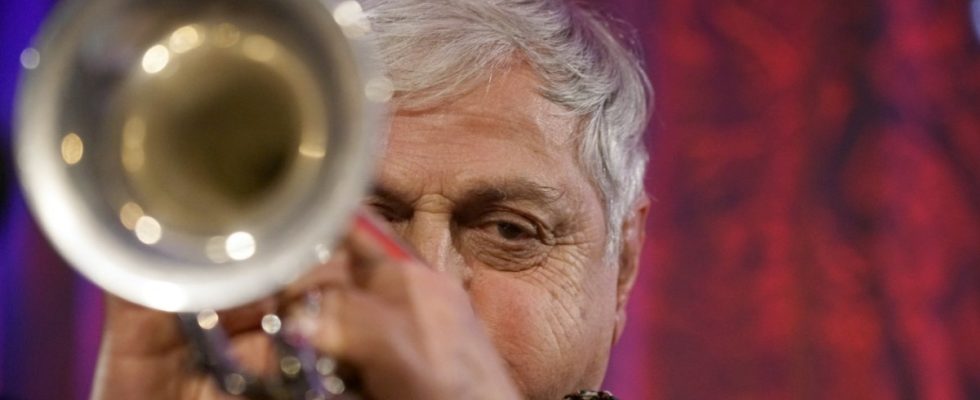Normally, brass players, like athletes, have a biological expiry date: when lung volume and lip tension diminish. Only for the jazz trumpeter Dusko Goykovich that didn’t seem to apply. Even in old age, the man, who always looked at least 20 years younger than he was, blew like a young god. Everything looked effortless with him, and he casually had what is probably the longest career of all jazz trumpeters.
In truth, there was iron discipline behind it. He practiced at least three hours a day, “according to his own system,” as he explained. For years, the Hotel Bayerischer Hof let him into the nightclub, which was deserted during the day. Later he was allowed into a room of the Jazzinstitut im Gasteig. From time to time he was seen drinking his beloved glass of white wine in the cafeteria, also part of his method.
Who knew that the “man with the miracle horn” was sitting there, as the Americans had dubbed him in the 1950s? The “Bosnian miracle trumpeter” as he later became known in Germany. Born Dušan Gojkovic in Jajce, Bosnia, in 1931, he grew up in Belgrade, musically initially more in the folk music tradition. But even as a boy he secretly listened to Willis Conover’s jazz programs on the radio station “Voice of America” and watched Hollywood films such as “Young Man with a Horn” with Kirk Douglas. As cool as he wanted to be, trumpeter Roy Edridge became his first hero. At 15 he bought an old cornet “on commission”.
With a camp bed in the jazz cellar
After music school he started in 1950, just 19 years old, with the Belgrade radio big band RTS. In 1955 he was able to turn his back on the restrictive Yugoslavia when Carlo Bohländer brought him into the radio band of the Hessian radio. In Frankfurt, at that time the German jazz capital, he was able to meet all the greats he admired in the legendary “Jazzkeller” – where he had stayed with camp bed and sleeping bag: Attila Zoller, Oscar Pettiford, Dizzy Gillespie, with whom he soon bonded as much as later with Stan Getz, Chet Baker and Miles Davis.
After stints with Max Greger and especially Kurt Edelhagen’s WDR Big Band, he moved on to the USA in 1958, where he was a minor sensation at the Newport Jazz Festival that same year and was passed around among US stars from then on. Woody Herman, Gerry Mulligan or Sonny Rollins, then the Clarke Boland Big Band (“my best time”) – there was hardly a name of repute with which he had not played together during this time. And that despite the fact that he was one of the first Europeans to complete his studies at the famous Berklee College of Music.
“Everything I know I learned there. Not trumpet, but composition and arrangement. Herb Pommeroy was my teacher. Stan Kenton, Count Basie and even Duke Ellington wanted me to join their bands along the way, but I really wanted to finish college . That decision still haunts me today,” he said later. Two days after graduating, he accepted the first offer. It came from Maynard Ferguson.
“Five years in New York were enough for me.”
But life as a musician in the USA was tough. “Five years in New York were enough for me. Black people weren’t allowed to fly back then. We drove thousands of kilometers in the bus,” he said. He went back to Germany, first to Cologne, then to Munich in 1968, then “the hub of the scene”, as he says: “Everyone went to Munich back then, from everywhere: Joe Haider, Klaus Doldinger, Olaf Kübler, Nathan Davis ; Mal Waldron came two months after me. There were still a lot of studio jobs back then. And in the evenings we went to the clubs. It was also the heyday of the Domicile on Siegesstrasse, where I played in the house band for a long time.”
Since then, Goykovich has been at home in Munich and a key figure in the scene: as the founder of the Munich Big Band, as the first director of the State Youth Jazz Orchestra and with countless publications, above all on his Munich house label Enja.
His album “Swinging Macedonia” founded the first “Balkan jazz” trend with the mixture of the melismas and rhythms of his homeland with the jazz idiom. But he always managed to reinvent himself, sometimes with soul, sometimes with Brazilian music, but always swinging and with those inimitably elegant trumpet lines.
First his wife died, then he fell ill with his lungs
He has won whatever prizes there were to be won, from the Jazz Echo to the “Berklee Master of Global Jazz Award”, which has only ever been awarded twice. In 2015 he received the Music Prize of the City of Munich, also only the second jazz musician after Klaus Doldinger. He still played big in the old town hall hall.
But when his beloved wife, whom he met in the travel agency in the early 1960s and who took care of all his trips and appointments to the end, died a little later, he was hit hard. After that, his age was noticeable for the first time, even if he gave guest appearances and concerts until shortly before the Corona break.
Shortly before his 90th birthday last year, he fell ill with his lungs, and he was no longer able to play at the big party in the Unterfahrt that was usual for his milestone birthday. Putting down the trumpet must have cost him the courage to face life. Dusko Goykovich died in the night from Wednesday to Maundy Thursday at the age of 91.

